
I work part-time at a big box store which sells firearms. However, after years of gun sales, I’ve been burnt out and only stock shelves. I still overhear some of the conversations between sales associates and customers. This inevitably reminds me of why I got out of sales. One of the most recent prompted this article. An associate at this store commented to a customer that “civilians have no reason to own a suppressor.” I heard this second hand, so I can’t quote the whole conversation, but I have to admit, it isn’t the first time I’ve heard it. Rest assured, had I been present; an education would’ve been given.
Suppressors also go by another nomenclature, “silencers.” However, this is a misnomer that lends itself to the misinformation of the day. Suppressors muffle the sound made by a firearm. They bring the decibels of the gunshot down to a more tolerable level, keeping the shooter with hearing that will continue to serve them for years to come.
Anyone that has been in the military or hunted for years knows the ringing in the ears that accompany a gunshot. Military men and women are especially susceptible to permanent hearing loss due to the amount of firing they do without hearing protection. Hunters share this since we can’t wear hearing protection in the woods and hear the quarry at the same time. In short, suppressors allow us to shoot, whether for sporting, hunting, or duty, without having to wear bulky ear muffs or flimsy earbuds. There are some other benefits as well, and of course some considerations, but the main reason to get a suppressor is to protect your hearing. It’s that simple. Can you think of a reason a “civilian” would want or need one?
Common Myths
Completely Silent – Let’s go over why the “scary” suppressor gets a bad rap. On May 31st, 2019, an angry city employee used a suppressed .45 to kill 12 at a municipal building in Virginia Beach. This prompted a whole new round of proposed gun control legislation that was aimed at these devices, claiming that the suppressor made the response time longer due to the lack of recognizable gun noise. The problem with this is one of the bystanders described the sound like a “nail gun,” which prompted the call to 911. If you’ve ever been around both a nail gun and a suppressed pistol, you know they are both loud enough to be recognized and heard. In fact, if you look up OSHA regulations, hearing protection is listed as a needed item while operating a nail gun. If a nail gun is this loud, then the comparison doesn’t make a cogent argument.
Too many people get their firearms information from TV and social media these days without any facts to back up these claims. In the movies, a suppressor silences the gunshot to the point that all you hear is the air being pierced by the bullet. The reality is far from this bit of fiction. While it does muffle the sound, it makes the sound of a .45 about that of a .22. Still a gunshot but not ear damaging noise. People forget that TV and movies do things like this to entertain. That is their job, after all.
They are illegal – Another thing I hear from those with no knowledge is that they are illegal. The truth is, of course, opposite that. They are completely legal for any law-abiding American that lives in one of the 42 states that allow them. Just like a firearm, they are serialized and regulated, but they are legal. They are covered under the NFA Title II Gun Control Act of 1968. This Act regulated machine guns, destructive devices, explosives, short-barreled rifles and shotguns, and suppressors.
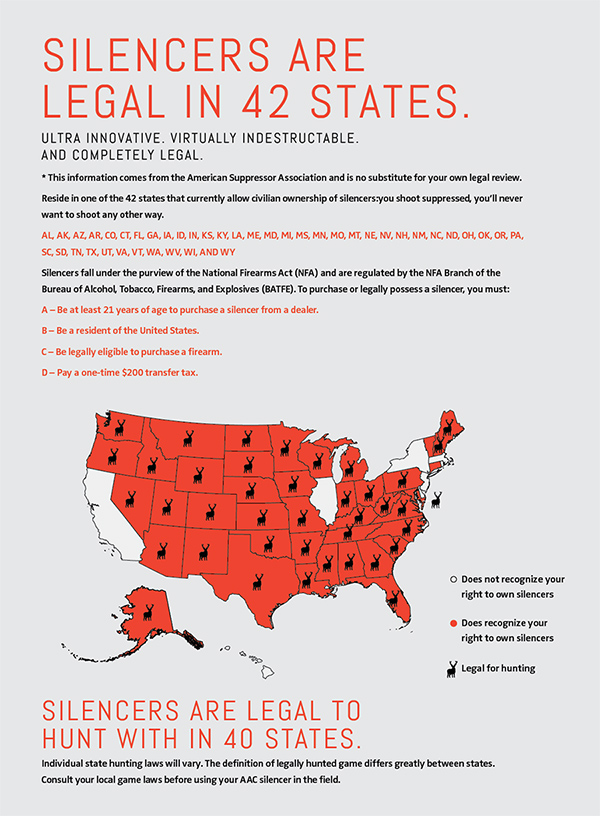
Besides the firearm, you intend to put the suppressor on you need to fill out an ATF Form 4, get your Special Opportunity Tax stamp (SOT), and set up a living trust or corporation or fill out the paperwork as an individual. After that, you wait. It can take a while too. I’ve heard everything from 6 weeks to 6 months. Once your SOT is approved, you pick up your suppressor from the FFL dealer and have fun.
There’s no need for one – There is no use for the average citizen, is the most common, and pretty much covers the vast majority of ill-feeling for these devices. Simply put, they’ve never used one, it’s foreign to them, and therefore it’s wrong.
First and foremost, I say you have a “Right to bear arms.” Need that makes sense to your neighbor or acquaintance doesn’t come into play. That same person may not need the $300 boots they have on or the leather seats in their car, but I bet you they still have them. They can probably give you a justifiable reason why they chose them. The only person you need to justify the purchase to is yourself, and possibly your significant other. However, if you’d like to educate yourself on some of the benefits to determine whether you can justify the purchase for yourself, I’d like to give you the main reasons.
Facts
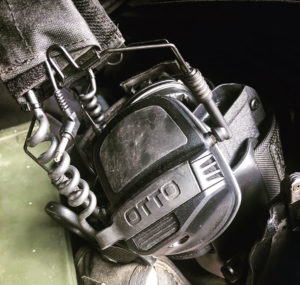
Hearing Protection – Hearing is front and center when it comes to suppressors. That is what they are built for. It allows you to shoot without hearing protection and will enable you to keep your hearing intact. At 40 years of age, I have already had several hearing tests with concerns over the loss of hearing in my right ear. My wife can tell you, over the last few years, the volume of the TV keeps creeping up, and when I sit in the silence of the woods, there is a ringing that is not conducive to hearing a whitetail sneak up. At 40, I shouldn’t be quite this bad. Whenever I do talk to hearing doctors and specialists, the conversation is pretty much the same.
Doctor: “Do you have any hobbies or work that involve loud noise?”
Me: “I’m an avid hunter and shooter.”
Doctor: “Yep, I figured. You’ve got a good bit of hearing loss in your right ear that I’d like to keep an eye on. Do you wear hearing protection?”
…. You can guess the rest from there. You only get one set of ears and one set of eyes. When it comes to shooting, protect them at all costs. When I’m hunting, I can’t justify wearing earmuffs. Even the nice electronic ones mess with me and just don’t work. So, when I shoot a deer, bird, squirrel, etc. I end up with a gunshot going off near my unprotected ear.
By getting and using a suppressor, I can reduce that sound to a point, my ears don’t ring, and I don’t do any damage. It’s the sound of the gases after the bullet leaves the barrel that makes the bang sound. If I can’t cover my ears, then changing the sound of the gun is the next obvious thing. In January of 2019, the Hearing Protection Act was submitted to Congress as a way to make suppressors easier to obtain. While it did not pass the bases of the Act was that Americans shouldn’t have to suffer hearing loss because they enjoy the shooting sports.
Reduced Recoil – The escaping gases leaving the gun also cause recoil and muzzle rise. This is the main reason new shooters are encouraged to start with a smaller caliber, like a .22. The smaller calibers produce less recoil allowing shooters to control their reactions better. Compare this to a workout. You start with lighter weight or less time on the machine and work your way up to the bigger and better things. It takes time to build the muscles up to the point you strive for. Shooting is the same. You use muscles that you’ve never used before, which needs to be built up to control and handle bigger calibers.
Suppressors, redirecting the gases, slow them down before leaving the muzzle. This not only reduces noise but also reduces the amount of force they produce, thereby reducing the muzzle rise. This allows new shooters to fire a larger caliber without the full force coming back at them.
A personal example would be me teaching my 9-year-old daughter to shoot and hunt. She is good with a .22 and crossbow; however, due to the noise and forces a centerfire rifle makes, she is not comfortable trying one. I will be getting a suppressor for a .300 Blackout AR to reduce the recoil and sound to a point she will be comfortable shooting, allowing her to get out with a legal centerfire rifle for our deer season.
Even veteran shooters can enjoy the reduction in muzzle rise. I recently shot a .45 suppressed (it had been a while) and was reminded how easy it is to stay on target. The weight on the front end will feel a bit heavy at first; however, once you start shooting, you realize this also reduces muzzle rise. By using a suppressor, I was able to shoot a fist-size group at 20 yards with a .45 that I had never shot before. At the range or in real life, hitting the target and staying on target is the goal. By reducing the force of gases leaving the muzzle and adding weight to keep the muzzle down, you can get on target and stay on target, which gives the shooter a great deal of confidence.
Happy neighbors – Whether you live in the country or within city limits, neighbors are a factor. My neighbors are not close, but gunshots are loud. I can hear my neighbors from at least a quarter-mile away. It is just respectful and considerate to my neighbors to take the time of day and type of shooting I do into consideration. I love my whitetail and turkey hunting. I have land where we recently built a house that allows me to pursue this passion.
One primary concern with my game population is a large number of coyotes. These are considered nuisance animals in my state, which allows them to be pursued any time of day and at any time of year. Coyote hunting at night is a growing market in the hunting world as a way to control the rising number of these predators. I don’t believe my neighbors would be happy with the sound of my .308 going off at midnight.
A suppressor reduces this to the point that even a neighbor within a few hundred feet wouldn’t have their slumber disturbed by my predator control. In some parts of the world, it is considered rude to hunt or shoot outdoors without a suppressor. I know some people with the attitude of “I don’t give a blank what my neighbors think. It’s my right.” While this is true, life is much easier with happy neighbors.
There have been times I’ve been in a tree stand, the sun is setting, everything is quiet, and then bang, bang, bang. A neighbor half a mile away starts into their range session. Why they wait until the coldest and shortest part of the day to start shooting is beyond me. However, this is still their right, and I have to just deal with it. I could continue my peaceful existence if they chose to shoot with a suppressor instead.
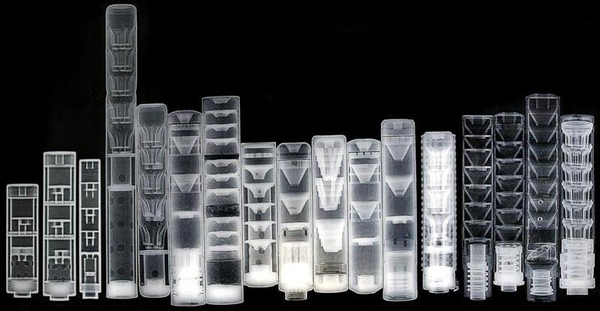
Conclusion
Ultimately the reason or use of a suppressor is up to you. Just like any other firearm, it’s a choice based on your needs and desires. I hope that this article shows that there are many justifiable reasons to own a suppressor. Whatever your desire may be, it is entirely reasonable and possible, if you are legally capable of owning a firearm. It will protect your hearing, make it easier to shoot, and is just plain fun. Get one and see for yourself.
Be sure to check out more from our Blog.
Want more posts like this one? Subscribe to Guns & Tactics Magazine to receive email updates and special offers direct to your inbox!
* The views and opinions expressed on this web site are solely those of the original authors and contributors. These views and opinions do not necessarily represent those of Guns & Tactics Magazine, the administrative staff, and/or any/all contributors to this site.


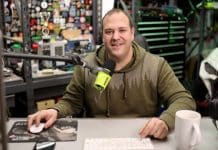
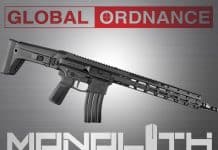
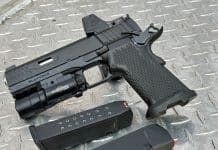
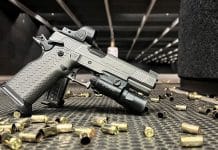

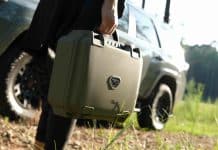
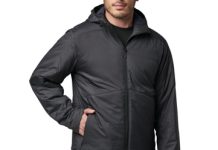
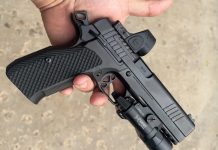
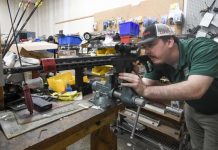
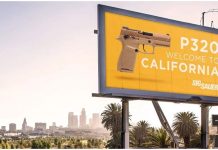

[…] and beliefs about these tools that are common misconceptions. Check out a previous article I wrote, Protect Your Hearing! The Facts and Myths of Suppressors. Suppressors are NFA-regulated items, so there is a good deal more to getting one than your […]